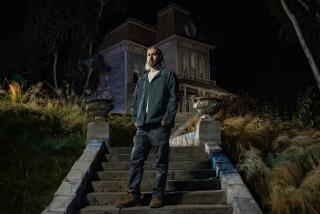Sister morphine
- Share via
ADDICTION is one hell of a trip. Writers have tackled this topic in works wrung through with both redemptive strength (“The Basketball Diaries”) and visions that spiral downward, becoming too dark to transcend (“Requiem for a Dream”). Los Angeles writer Michele Matheson’s debut novel, “Saving Angelfish,” seems to hover, for its first half, in the former category; soon, however, it seems there will be no hope for Matheson’s desperate protagonist.
In writing that’s disturbingly lucid, Matheson outlines the haphazard and blurry timeline that Maxella Gordon -- Max for short -- follows in the days leading up to Christmas. The struggling actress journeys through Los Angeles, from a flophouse to her trashed apartment, through an aborted commercial audition, to her mother’s home and then to a gangland crack house.
Her mother, Phyllis, frets silently over Max, eats gin-soaked prunes for breakfast and begins popping one too many Vicodin. Ernie, Max’s father, moved out years ago, but over time he and Phyllis have grown together again, so that now Phyllis is the only witness to his daily regimen of pills -- for high blood pressure, heart disease and acid reflux -- as well as nitroglycerin patches for chest pain. While her dealers and junkie friends add to her muddled existence, Max gains confidence from her mother’s love, and she knows with implacable certainty that her father needs his daughter’s help to get healthy.
Max’s sanity has been submerged in drugs for so long that it’s begun to slip from her grasp. Hallucinations of “sky dogs” haunt her significantly less-than-sober drives to and from various parts of town. Perhaps most significantly, there’s the talking angel. As Max is shoplifting in a drugstore, she encounters an angel -- a small ornament with soft wings and braids set high upon her head. “I’m God’s daughter,” chirps the little character with saccharine sincerity. “You’re God’s daughter too.” Max steals the angel, which continues, throughout the unraveling of the story, to supply a steady stream of advice that Max never seems to take.
The novel is shot through with the numbed horror of one who has confronted a terrible reality. Life becomes static when all hope has been extracted, rendering it a still-life painted with disturbing realism: The self-destructive patterns become hypnotic, dulling the senses. Matheson’s lengthy accounts of drug paraphernalia and preparation, and the subsequent dangerously submersing high, leave the reader with a sense that time is passing while Max remains trapped.
This is a flawlessly executed study of a life that’s fully dissolved. But Max’s rhythm of scoring drugs, getting high, coming down, getting sick and hunting for more melts into an inescapable haze, and after a while, the descriptions begin to wear on the reader.
Matheson illuminates the rigid, frozen lives of Max’s parents with dark clarity. As a gear turning the wrong way in a machine can cause the others to foul, one addict can spill unhealthful patterns and nervous silences into the most well-adjusted of families, until the entire familial machine is operating incorrectly. When Phyllis immerses herself in her gardening, her decorating or her prunes, she’s medicating her own heartbreak.
There are brief glimpses of hope. Max gets off heroin for a few short days when she’s kidnapped by a disabled Latina gangster turned dealer and the woman’s soul-sick son. She manages somehow to arrive at Christmas dinner with her family. Right before, when a fellow junkie steals her drugs, Max achieves a few moments of clarity. But just as quickly, any barely normal scenarios shatter, leaving Max desperate for some sort of quick fix to numb the pain. The addiction seeps into Max’s thinking like fog, leaving her incapacitated, socially unacceptable, even borderline psychotic.
The reader’s own frustration with Max, and the situations in which she’s trapped herself, mirrors the frustration of her parents. Despite her assertions that she wants “to be useful,” Max remains utterly purposeless, even to herself. Wanting something doesn’t instantly deliver it to our sides; recovery from chemical dependency often takes extraordinary measures, superhuman support and great courage. The problems we strive to escape through our own private addictions and unhealthful behaviors are not easy to face. For Max, they are impossible, too great to surmount, but Matheson herself has taken them head-on with this novel, which faces addiction with a courageous spirit Max herself cannot muster. *
More to Read
Sign up for our Book Club newsletter
Get the latest news, events and more from the Los Angeles Times Book Club, and help us get L.A. reading and talking.
You may occasionally receive promotional content from the Los Angeles Times.







